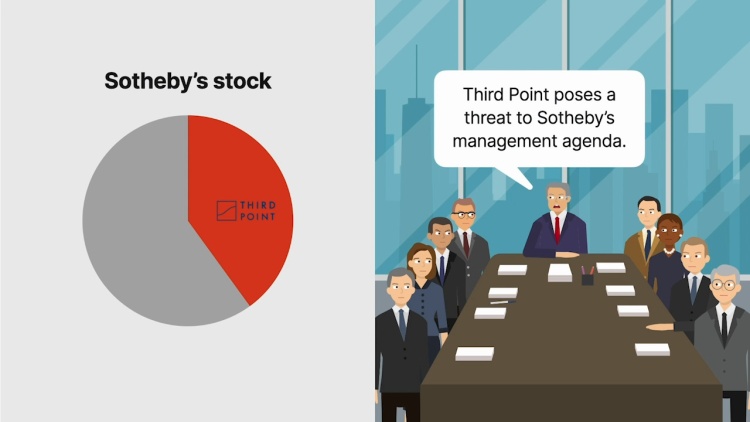Third Point LLC v. Ruprecht
Delaware Court of Chancery
2014 WL 1922029 (2014)

- Written by Sean Carroll, JD
Facts
Third Point LLC (plaintiff) was an activist hedge fund and the largest stockholder of Sotheby’s (defendant). Third Point continued to purchase additional stock in Sotheby’s, up to 9.6 percent at the time of suit. Sotheby’s board had a majority of independent directors, and Sotheby’s hired outside financial and legal advisors. Sotheby’s executives exchanged several emails about Third Point’s increasing ownership stake, and addressed the fund’s activity and how to handle it at multiple board meetings. William Ruprecht, Chairman and CEO for Sotheby’s, stated that Sotheby’s faced an “imminent activist effort to shift our management agenda.” Third Point publicized a letter in which it criticized the management and direction of Sotheby’s. Ruprecht concluded that Sotheby’s would be subject to a proxy contest, and that activist funds had a realistic chance to win. In response to this activity, Sotheby’s adopted a shareholder rights plan that contained a two-tiered triggering mechanism. The plan permitted stockholders who did not acquire their stock for any purpose related to changing control of the company to own up to 20 percent before triggering the plan. But for stockholders who acquired their stock for any such purpose, the plan would kick in as soon as they acquired 10 percent. Third Point sued, claiming Sotheby’s breached its fiduciary duties by adopting the plan, and moved for a preliminary injunction.
Rule of Law
Issue
Holding and Reasoning (Parsons, J.)
What to do next…
Here's why 907,000 law students have relied on our case briefs:
- Written by law professors and practitioners, not other law students. 47,100 briefs, keyed to 996 casebooks. Top-notch customer support.
- The right amount of information, includes the facts, issues, rule of law, holding and reasoning, and any concurrences and dissents.
- Access in your classes, works on your mobile and tablet. Massive library of related video lessons and high quality multiple-choice questions.
- Easy to use, uniform format for every case brief. Written in plain English, not in legalese. Our briefs summarize and simplify; they don’t just repeat the court’s language.





